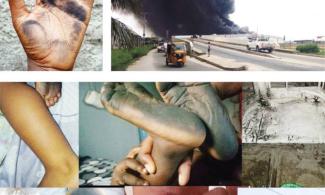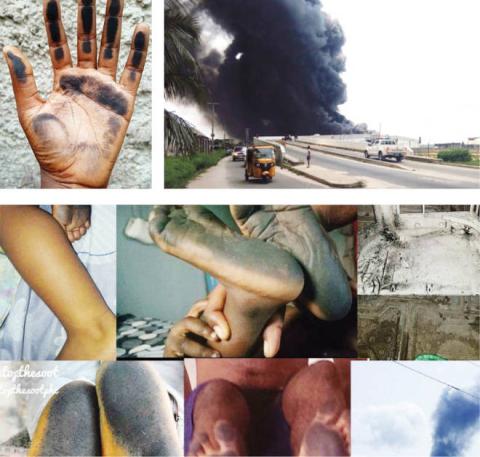
More than one year after its devastating impact was noticed by residents of Port Harcourt and its surroundings, the poisonous emission otherwise known as black soot has continued to pose a threat, especially to residents of Port Harcourt, Oyigbo, Obio Akpor, Ahoada, Degema, Bonny, Okrika and Eleme LGAs. The soot, usually observed early in the morning, appears to have defied solution.

More than one year after its devastating impact was noticed by residents of Port Harcourt and its surroundings, the poisonous emission otherwise known as black soot has continued to pose a threat, especially to residents of Port Harcourt, Oyigbo, Obio Akpor, Ahoada, Degema, Bonny, Okrika and Eleme LGAs. The soot, usually observed early in the morning, appears to have defied solution.
The soot comes in form of black dust-like particles, noticeable on ground surfaces, cars, houses, and any other items that are exposed. The substance also gets trapped in nostrils, causing breathing problems to humans, with residents having complained that they cough out dark phlegm. The soot also covers rooftops, to the extent that rain water turns black, with experts declaring it acidic.
Several measures, such as shutting down doors and windows, regular bathing and washing of hands and faces, as well as wearing masks, have been adopted to guard against the hazardous soot.
The Rivers State government has expressed worry, and some concerned organizations and institutions have offered diverse opinions and interpretations. World Health Organisation (WHO), in its 2012 report, described black soot as a good indicator of combustion-related air pollution. The report recognized it as a short-lived climate force, which contributes to warming the atmosphere.
According to the report, toxicological studies suggest that black carbon may operate as a universal carrier of a wide range of variety of chemicals of varying toxicity to the human body. The report further indicated that black carbon is the material emitted from gas and diesel engines, cool-fixed power plants and other sources that burn fossil fuel.
Residents, and even non-governmental organizations have on several occasions taken to the streets of Port Harcourt to demand an immediate remedy to what they described as life-threatening emissions. The protesters also called on companies operating in the state to adopt safety measures, while others blamed the activities of illegal oil refiners, as well as companies that own asphalt distilling plants.
Rivers State government in 2017 set up a task force to tackle the soot polluting Port Harcourt and its environs, with the State Commissioner for Environment, Prof. Roseline Konya and her Information and Special Duty counterparts, as members.
Shortly after its inauguration, the task force swung into action as it shut down three companies in Port Harcourt, suspected to be emitting soot. But residents of Port Harcourt and its environs are still exposed to danger.
Rivers State Governor, Nyesom Wike, blamed the life-threatening menace on the activities of security agencies, who he accused of setting ablaze illegal refineries and stolen crude oil without precautionary measures. He said that he has formally approached the Federal Government to help resolve the challenge, but without any assistance so far.
Wike said on a TV programme recently: “We’re working with international oil companies to provide solutions. The Federal Government should as matters of urgency, intervene because the solution is within its purview.”
Again on April 18, Wike accused the FG of deliberately planning to eliminate a greater percentage of the state’s population by its failure to act on the soot and its primary causes.
Wike also announced that the State Attorney General had been directed to sue the Federal Government and International Oil Companies (IOCs) operating in the state over the soot. He stated this when he addressed a delegation of the United Nations (UN), at the Government House, Port Harcourt, during a high-profile meeting to tackle the soot.
“Thank God that the UN has come in view of the issues we have raised. We thank them for their concern on the soot,” Wike said. He also said the refusal of the FG to act on all data supplied on the soot was a deliberate ploy to make Rivers people suffer health hazards, which will lead to untimely deaths.
Some days after Wike made the allegation before the UN delegation, the FG said it had identified 11 sources generating soot in the state, and is working out plans to eliminate same.
Minister of State for Environment, Ibrahim Usman Jibril, stated this, when he spoke in Terabor, Gokana LGA while inspecting the ongoing medical outreach organized by the Hydrocarbon Pollution Remediation Project (HYPREP).
Jibril disclosed that he had a joint meeting on the soot with stakeholders in Rivers, organized by the National Environmental Standards and Regulations Enforcement Agency (NESREA) in Port Harcourt. He assured that the ministry would work with relevant stakeholders, both in the state and federal levels, to eradicate soot from Rivers and its environs.
Medical experts also are of the opinion that inhalation of black carbon is associated with health problems. The problems according to them, include respiratory and cardiovascular disease, cancer and birth defects. Speaking under anonymity, they said there is high rate of respiratory diseases in the state, caused by polluted environment.
Civil Society Organisations (CSOs) in the state also lamented and called on the FG to find a solution to the soot. The Civil Liberties Organisation (CLO), South-South zone, had said the government should be held responsible for environmental degradation and soot generation.
Zonal Chairman of the CLO, Karl Chinedu Uchegbu, accused the FG of abusing the fundamental human rights of the public. “It’s frightening that the authorities responsible for ensuring respect for human rights, including the right to safe and clean environment are watching while people’s right to health, life, and a clean environment are being threatened. The health hazard, which the continuous inhaling of soot-contaminated air exposes to people in the affected area, is scary,” he decried.
According to the group, “We hold the FG and its agencies, including NEMA, DPR, NOSDRA, NESREA, NNPC, the military, Civil Defence and other security operatives, as well as the IOCs and oil joint ventures responsible for the destruction of the environment. Their actions and or inactions singularly and or collectively have led to the soot menace, which has become a source of a nightmare to residents. The failure of oil operators to protect their facilities and the failure of the government of the federation to make available refined petroleum products have made pipeline vandalism and illegal refining attractive.”
Uchegbu added, “We urge the FG to declare a state of emergency on the environment of Rivers State and other parts of the Niger Delta. There is need to focus undivided attention on the soot problem by the government until it is stopped. We also urge the FG to prevail on security operatives to stop burning illegally-refined products they confiscate as that process leads to environmental pollution, including the soot.”
Meanwhile, some of the security organizations have absolved themselves of any complicity in the soot menace. Spokesman of Operation Niger Delta Safe, Major I. Abdul said that their operations in the Niger Delta is applied strictly based on the mandate given to them, which he said is to protect oil and gas infrastructure from militants and other criminal elements in the Niger Delta.
The Nigerian Security and Civil Defence Corps’ spokesman, Akin Oguntuase, said the command is not involved in a destruction of illegal refinery and impounded petroleum products, adding that they have a dump site at Iriebe in Obio Akpor LGA where impounded petroleum products are kept.
Recent checks show that the soot is still present, with sheets of black particles covering most exposed surfaces in Port Harcourt and environs, casting a dark shadow.